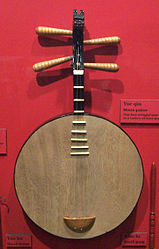This article needs additional citations for verification. (April 2021) |
 The yueqin. The instrument comes in a variety of sizes and pitches. | |
| String instrument | |
|---|---|
| Classification | String instrument |
| Hornbostel–Sachs classification | 321.322 (Composite chordophone) |
| Developed | China |
| Related instruments | |
| Ruan | |
The yueqin (Chinese: 月琴; pinyin: Yuèqín; Japanese: 月琴, romanized: Gekkin; Korean: 월금/月琴, romanized: Wolgeum; Vietnamese: Nguyệt cầm or Vietnamese: Đàn nguyệt), also called a moon lute or moon guitar, is a traditional Chinese string instrument. It is a lute with a round, hollow soundboard, a short fretted neck, and usually four strings. It is an important instrument in the Peking opera orchestra, often taking the role of main melodic instrument in lieu of the bowed string section.
The instrument was invented in China in the 3rd to 5th centuries AD, during the Jin dynasty.[1] The ruan, another Chinese instrument, is the ancestor of the yueqin.[1] The name yueqin once applied to all instruments with a moon-shaped soundboard, including the ruan; however, "yueqin" now applies to a separate category from the ruan family.